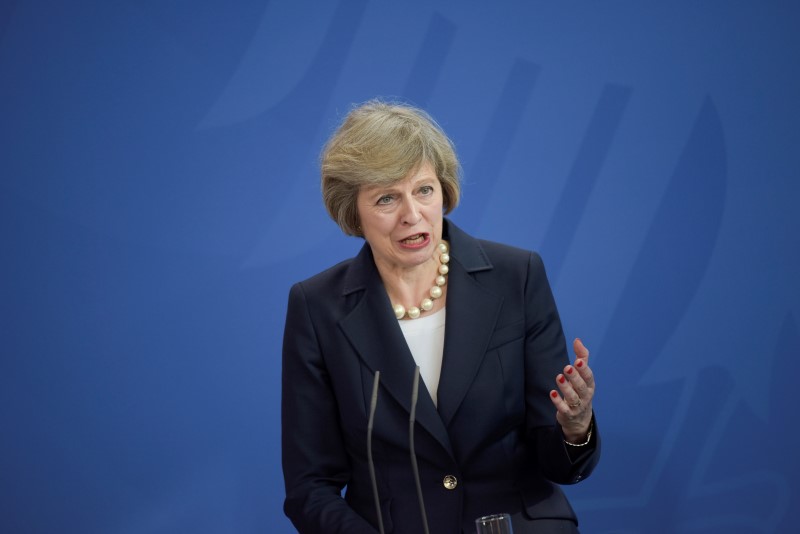By Elizabeth Piper and Paul Carrel
BERLIN (Reuters) - Prime Minister Theresa May sought to reassure Germany on Wednesday over Britain's vote to leave the European Union, stressing her desire to deepen ties with neighbouring countries in her first foreign visit as leader.
But while Angela Merkel agreed with May that Britain needed time to put together a negotiating stance before triggering a formal divorce from the bloc, the German chancellor was clear that no one wanted "a long period of limbo".
May, appointed a week ago after David Cameron resigned over the result of the EU vote, has appealed for time to work out how best to attack the unprecedented and complex negotiation for Brexit, with the other leaders in the bloc offering little sign they will make things easy for Britain.
By heading to Germany and then later to France, May is keen to sound out the EU's two most powerful leaders, Merkel and President Francois Hollande, as, officials expect, the EU's biggest member states will take a lead in the talks.
"(The visit) underlines my personal commitment to bring a strong and constructive partnership ... a partnership that works for the benefit of people here in Germany and people back home in Britain," May told a news conference standing next to Merkel.
"I also want to be clear here today, and across Europe in the weeks ahead that we are not walking away from European friends."
Merkel reiterated that there could be no formal negotiations on the terms for a post-Brexit Britain before London invokes Article 50 of the EU's Lisbon Treaty to trigger the formal exit procedure. She urged May not to wait too long.
"Nobody wants a long period of limbo. Neither the British people nor the European member states," Merkel said.
"Everyone has an interest that the preparations are conducted in a thorough manner, that the positions are clear, and I think it is absolutely understandable that Britain needs a certain amount of time for this."
May has said that Britain would not trigger Article 50 this year.
MILITARY HONOURS
The new British leader was received by a guard of honour, a military brass band and dozens of solders standing to attention. She was heard saying the scene was "very splendid" before heading for brief talks.
She later had dinner with Merkel to further discuss Brexit over a meal of tuna with mango chutney and veal with mushrooms.
Since May's emergence as British prime minister, much has been made of the stylistic similarities between the two women: both daughters of pastors, both with reputations as no-nonsense pragmatists, who rose to the top of conservative parties dominated by more conventionally outgoing men.
Speaking of their relationship, May said they were "two women here who ... if I may say so, I think get on with the job. Both want the best possible results for the people of the UK and Germany". Merkel answered: "Exactly".
But both leaders are under no illusion about how tough the talks on Britain's departure might be.
May, who has struggled to control migration into Britain, must try to balance voters' demands for a reduction in movement of people from the other 27 members of the bloc and a desire from business to keep access to the lucrative EU single market.
Described as "utterly intractable" by a Cameron ally, May will be up against the equally tough Merkel, who has told Britain it will not be able to "cherry pick" what it wants to keep from its EU membership.
In France on Thursday, Hollande, under pressure after last week's deadly truck attack in Nice, will also be firm in demanding that Britain either sign up to EU rules or suffer the consequences.
He is keen to dampen the popularity of Marine Le Pen and her far-right National Front, which wants a French "Frexit".
For Merkel, she indicated she was more than ready to start negotiations with Britain, which she described as "an experienced country in terms of its diplomatic skills".
"Negotiations with British governments are always taxing, interesting and tactically clever and even while competing with our negotiating strategies we try to work on an equal terms - it's always exciting," she said.

"I mean even during Britain’s years as a member of the European Union the negotiations with Great Britain were never trivial."